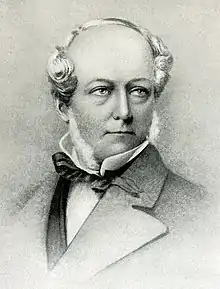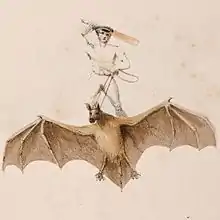 | |||||||||||||||||||||||||||
| Personal information | |||||||||||||||||||||||||||
|---|---|---|---|---|---|---|---|---|---|---|---|---|---|---|---|---|---|---|---|---|---|---|---|---|---|---|---|
| Full name | Nicholas Wanostrocht | ||||||||||||||||||||||||||
| Born | 5 October 1804 Camberwell, London, England | ||||||||||||||||||||||||||
| Died | 3 September 1876 (aged 71) Wimborne Minster, Dorset, England | ||||||||||||||||||||||||||
| Batting | Left-handed | ||||||||||||||||||||||||||
| Bowling | Slow left arm orthodox | ||||||||||||||||||||||||||
| Role | Batsman | ||||||||||||||||||||||||||
| Domestic team information | |||||||||||||||||||||||||||
| Years | Team | ||||||||||||||||||||||||||
| 1834–1852 | Kent | ||||||||||||||||||||||||||
| 1846–1852 | Surrey | ||||||||||||||||||||||||||
| Career statistics | |||||||||||||||||||||||||||
| |||||||||||||||||||||||||||
Source: CricketArchive, 3 July 2020 | |||||||||||||||||||||||||||

Nicholas Wanostrocht (5 October 1804 – 3 September 1876), known as Nicholas Felix, was an English amateur "gentleman" cricketer. He was one of the few players who – at his request – was routinely known by his pseudonym, Felix. When his father died in 1824 he had inherited the running of his school, aged only nineteen, and he was afraid that the parents of pupils might think that cricket was too frivolous a pastime for a schoolmaster.
Felix was a specialist left-handed batsman, although he did occasionally bowl underarm slow left-arm orthodox. He was a mainstay of the great Kent team of the mid-19th century alongside such players as Alfred Mynn, Fuller Pilch, William Hillyer and Ned Wenman. In the words of the famous elegy, best loved of Bernard Darwin,
- And with five such mighty cricketers 'twas but natural to win
- As Felix, Wenman, Hillyer, Fuller Pilch and Alfred Mynn.
Felix played for Kent from 1830 until 1852. He also appeared for MCC sides and was a member of William Clarke's All-England Eleven.
In his overall first-class career, Felix played in 149 matches and scored 4,556 runs with a highest score of 113. He played at a time when prevailing conditions greatly favoured bowlers and was rated very highly as a batsman by his contemporaries.[1]
He was the author of a famous instruction book: Felix on the Bat published in 1845. He also invented the catapulta (a bowling machine) as well as India-rubber batting gloves. A man of many talents, he was also a classical scholar, musician, linguist, inventor, writer and artist.
Felix died at Wimborne Minster in Dorset and is buried in Wimborne cemetery.
References
- ↑ Carlaw D (2020) Kent County Cricketers A to Z. Part One: 1806–1914 (revised edition), pp. 164–168. (Available online at the Association of Cricket Statisticians and Historians. Retrieved 2020-12-21.)
- Scores & Biographies, Volume 1 by Arthur Haygarth
- Barclays' World of Cricket – 2nd Edition, 1980, Collins Publishers, ISBN 0-00-216349-7, p. 10.
External links
 Media related to Nicholas Felix at Wikimedia Commons
Media related to Nicholas Felix at Wikimedia Commons- Nicholas Felix at ESPNcricinfo
- Felix on the Bat